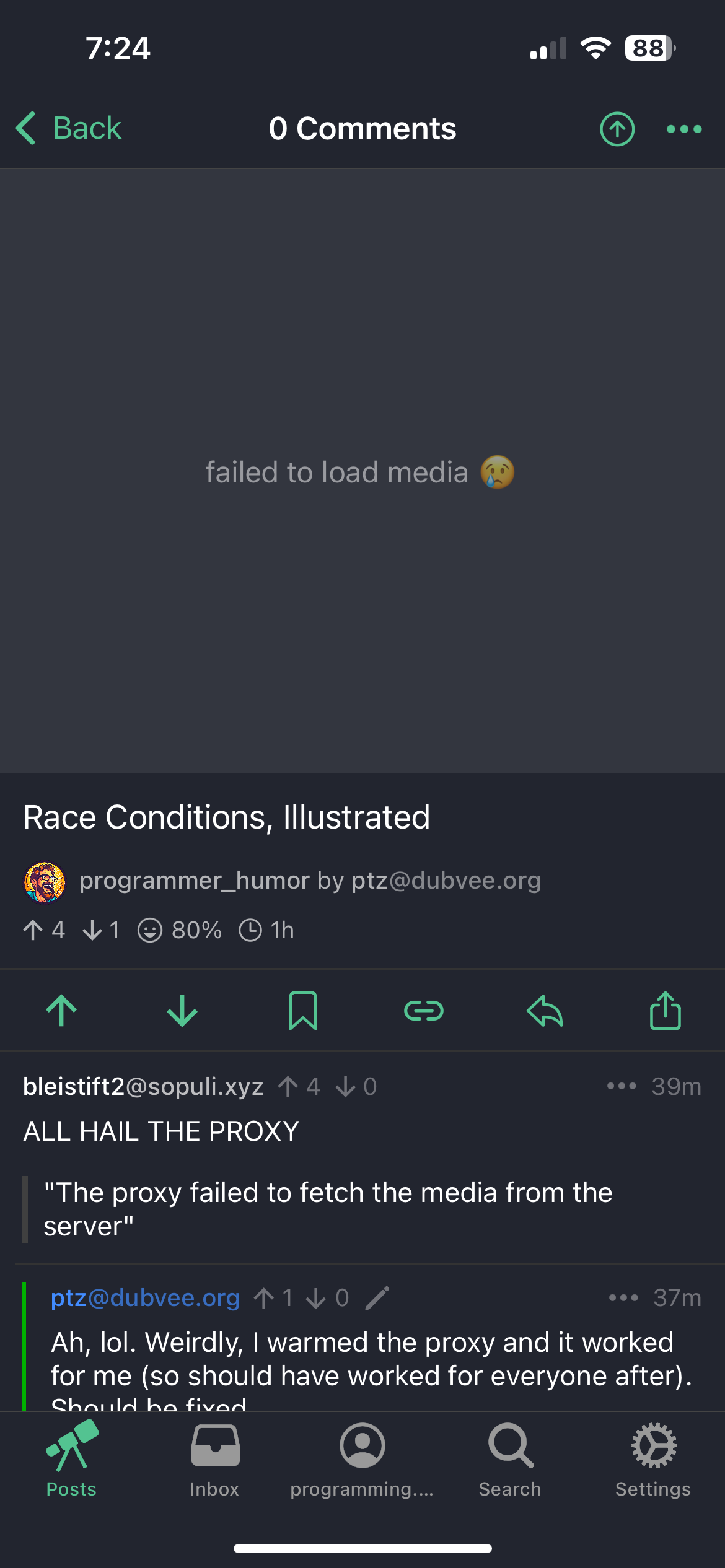There’s cryptpad though I don’t have a clue how complicated it is to manage. But it’s a decent user experience.
- 1 Post
- 149 Comments

 4·1 month ago
4·1 month agoWell that’s fair. I had to look closely. It’s a ready made soup. Not just spice. I’m finally getting this post now.

 6·1 month ago
6·1 month agoOh ok. I didn’t realize it’s specifically for soup. But also, it’s probably tasty in some soups like a carrot or butternut squash soup 🤣

 7·1 month ago
7·1 month agoI’m not following this one yet. What’s wrong with the pumpkin spice?

 30·2 months ago
30·2 months ago
I’m really not sure if “Failed to load media” is a voyager error or the real post 🫠

 3·5 months ago
3·5 months agoI use proton vpn and Firefox Focus on iOS. I’m not sure which of them is doing the heavy lifting, but I rarely see ads on my phone.
 8·6 months ago
8·6 months agoMarkdown is my preference. It’s certainly not perfect for formatting. But it’s fantastically simple because it’s barely more than plain text. And it’ll usually look good in the end

 4·6 months ago
4·6 months agoIf you’d like to learn more about Haptic, why it’s being built, what its goals are and how it differs from all the other markdown editors out there, you can read more about it here.
As others have noted, the app doesn’t work on mobile yet. Anybody willing to share the content here for mobile users?

 1·6 months ago
1·6 months agoThat basic idea is roughly how compression works in general. Think zip, tar, etc. files. Identify snippets of highly used byte sequences and create a “map of where each sequence is used. These methods work great on simple types of data like text files where there’s a lot of repetition. Photos have a lot more randomness and tend not to compress as well. At least not so simply.
You could apply the same methods to multiple image files but I think you’ll run into the same challenge. They won’t compress very well. So you’d have to come up with a more nuanced strategy. It’s a fascinating idea that’s worth exploring. But you’re definitely in the realm of advanced algorithms, file formats, and storage devices.
That’s apparently my long response for “the other responses are right”

 1·7 months ago
1·7 months agodeleted by creator

 73·8 months ago
73·8 months agoI like that Meta is fined for this bad practice. But why are they paying the state? How does this help anyone that was actually victim of the facial recognition?
I can see an argument based on how state funds help state residents. But it still doesn’t really feel right to me.
A real tangential thought: What if fines claimed by the state didn’t increase the states fund? What if those funds reduced the tax burden of residents from the bottom up?

 26·8 months ago
26·8 months agoWell that’s foreboding to say the least.
I listened to a bit of the speech to see if the context helps at all. It doesn’t. He was just asking people to go vote, which is totally fine. But that’s it. Nothing else to warrant a comment like this one. And it sure sounds like no more voting is the plan. Literally. Maybe it’s a thoughtless comment? Yikes
Have you tried The First Descendant yet? It’s pretty rough with load times and beats the cap out a graphics card. Is that considered AAA?

 15·8 months ago
15·8 months agoWell this was oddly nostalgic for me to read. You immediately reminded of FFVI
I think this is a side effect of sharing and discussion these events online, especially in a link aggregator like Lemmy. You can you see inconsistent views presented in multiple threads yet they feel as if you’re interacting with the same group of people.
Some people are happy about this turn of events while others are not. I expect that you’re seeing differing major opinions from separate groups of people.

 1·8 months ago
1·8 months agolol thanks for the answer. This is the really relevant bit isn’t it? My Linux machines have also never died this badly before. But I’ve seen windows do it a number of times before this whole fiasco.

 15·8 months ago
15·8 months agoThis is funny timing for me. I mentioned something related to my wife yesterday. When I was a kid, my perception of other countries was completely ridiculous. Low tech, uncivilized, impoverished, etc. compared to the USA. It took way too long for me to achieve a more realistic perspective of foreign countries at large. I’m not sure who to blame for this but the they surely belong to the previous generation or two.

 1·8 months ago
1·8 months agoWhat’s the user experience like there? Are you prompted to do it if the system fails to boot “happily”?

 2·8 months ago
2·8 months agoI’m familiar enough with Linux but never used an immutable distro. I recognize the technical difference between what you describe and “go delete a specific file in safe mode”. But how about the more generic statement? Is this much different from “boot in a special way and go fix the problem”? Is any easier or more difficult than what people had to do on windows?


I expect someone will start a business to remove that aftermarket